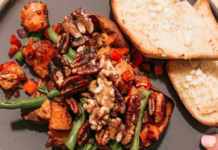As a nutrition expert who has spent most of my career in Corporate Wellness, I was thrilled to find out that Jill Castle, MS, RD, child nutrition expert, mom of 4, and co-author of Fearless Feeding: How to Raise Healthy Eaters from High Chair to High School, lives right here in Fairfield County. We met at Le Pain Quotidien to discuss child feeding tips and strategies, AND we’ve got a GIVEAWAY for you!
GIVEAWAY!
Her book, written along with co-author Maryann Jacobsen, MS, RD, is fantastic, and…. three lucky readers will win a copy of Fearless Feeding. To enter, put a comment in the box below by August 2 of either a feeding challenge you are facing or an accomplishment.
Elysa: Tell us about why you decided to write Fearless Feeding
Jill: While there are great books about children’s nutrition, there was a need for a comprehensive book that talks about feeding on infancy to teenagerhood and provides details on the nutrition aspect of feeding. What are the most important nutrients at every age, and how can my child get them? What do I do if my child doesn’t like milk? What if they don’t eat meat? We provide a three-pronged approach explaining what to feed your children, how to do it positively, and why kids behave the way they do around food.
Elysa: You mean like when your two-year-old won’t eat something that they LOVED the day before? Do all kids go through that picky eater phase?
Jill: Kids in that 2 -3-year-old age range are becoming more independent, and they also tend to become more food neophobic; they are afraid of different foods. Put those two things together, and you get picky eating during the toddler years. Learning to eat is like learning to read or drive. Don’t expect your children to like everything right away. It takes baby steps!
Elysa: So, how should you handle your picky eater? What are some do’s and don’ts?
Jill: It’s a great idea to include at least one food with each familiar meal, along with introducing new foods or foods that they have rejected before. Just because they grimace when you introduce a food the first time doesn’t mean they’ll never eat it. It’s new – new flavor, new texture. Keep trying, but keep your attitude neutral. Saying, “But it’s GOOD for you. You NEED to eat it,” puts a lot of pressure and focus on the meal. Just keep trying and then move on. Instead of talking about “But you liked it YESTERDAY,” discuss general observances like “The carrots are orange. What else is orange?”
Elysa: How about food as a reward? My instinct as a Nutritionist is that’s not a great idea, but a lot of parents tell me “easier said than done.”
Jill: Nonfood rewards, like stars stickers, can reinforce good behavior and is something you can repeat for a long time without negative consequence. Rewarding with food “If you behave, you can have ice cream” or “If you eat your broccoli, you can have a cookie” puts all the value on the junk food, and your child will perceive those items as the goal while putting a negative connotation on the healthy food.
Elysa: How about older kids? How do you help preteens and teens have a healthy body image?
Jill: It starts from when they are younger, but good role modeling is key. Set a good example, eat healthy foods together. Eat what you want your kids to eat. Be active as a family. Talk about eating healthy, and the benefits of being active, but don’t focus on weight. Children’s bodies are constantly changing. Focus on taking the right actions as a family rather than talking about weight, and treat everyone in the family the same. {I told Jill about an experience I had counseling an overweight preteen whose parents treated her much differently than her sibling who was not overweight and how important it was for them to treat everyone in the family the same and eat the same healthy foods together for her to improve her body image and adopt healthier behaviors. It can’t be “us vs. her”}
And the structure is important. Kids and adults shouldn’t be eating all day without breaks. Meals and snacks should be offered at distinct times.
For so many more tips and strategies, check out Jill’s blog and book, and don’t forget to enter the giveaway.
What’s a feeding challenge you have faced, are you currently facing, or a feeding accomplishment?



























My son is 9 months old and he sure loves his food – or some of it anyway! I’m trying to start early to ensure that he eats a balanced diet and that he has a variety of foods in all food groups. Where I have been struggling is in the protein department. He’s not a fan of most proteins so I am always trying new ones, both animal and non-animal, and sticking it out by repeating ones he hasn’t particularly liked before, rather than only giving him chicken (which he does like). I’ve had some successes but some failures as well, and have even “disguised” some protein in his fruit, but my gut tells me that’s probably not the best solution. I’ll just keep trying.
Jen,
Protein sources can be tough (literally!) for little ones. Using the slow cooker really tenderizes meat and can be flavored many ways. To start, you could just do beef ( I have a recipe on my blog here: http://justtherightbyte.com/2013/05/favorite-crockpot-beef/)
Also, don’t forget about beans as a protein source! Rinse canned beans to reduce sodium, and let baby use fingers to eat, or mash with a fork. Beans are a great first finger food!
Thanks! I’ve got to try beef again – he hasn’t much liked it the few times I’ve tried to feed it to him. But he has loved lentils, so beans will be next on my list!
Thanks for this post! I have a problem eater with my oldest (mainly sensory related) and interested in reading Jill’s book. Fortunately, my son has no difficulty diving into different foods which goes to show that each child is different.
Shannon,
We cover problem eaters in the chapter called Fearful Nutrition Problems. There is a great chart, and a real life story guiding you on how to approach children with food sensory challenges.
Great post. I’d love to read the book. My 3-year-old used to eat everything I gave him and now he is obsessed with mac n’ cheese. He could eat it all day every day. I try to make it from scratch, at least I know what is in it that way. He does love fruit, which is great. He will eat any and all fruit I give him.
Abby,
Sounds like a food jag to me, which is normal for his age. Just be careful not to get “stuck” in a corner with limited variety of foods–it’s hard to get out of that situation! Keep on offering different foods and make sure he knows when you’ll offer mac and cheese, that way he’ll know he can have it, just not every day.
It feels like meal time is always a battle. My almost 9 month old seems to love solids (especially finger foods) more than his milk. He was refusing nursing, so I pump and give him bottles. Many days he doesn’t finish his bottles. Not sure if I should feed him solids if he is not finishing his milk.
Ali,
It sounds like he is ready to move forward. Little ones can get frustrated if they are ready, but parents are not. Have you tried putting a little bit of milk in a straw cup or open cup? He may be more interested in drinking it this way–bottles are still ok, but it’s time to introduce cup–we cover why in the book.
He’s also ready for solids–other foods contain calcium, like cheese and yogurt, so these are acceptable to introduce now.
We have extensive charts in the book about what to introduce, portions, balance, etc for infants–wonderful resource!!
I am concerned about food allergies appearing since I am gluten free. My baby is only 6 months old so she is still nursing 100%.
Ann,
If you are gluten free due to celiac disease, then you may want to discuss intro of solid foods with your pediatrician.
as it stands, unless there is a family history of food allergy (which you want to discuss with MD), you can introduce baby to solids between 4 and 6 months of age. There is no restriction on types of allergens to avoid anymore — all foods are fair game after one year. First foods are iron-fortified cereal, pureed meats, fruits and veggies–again, charts and special considerations for allergens are in the book.
I’ve got a fruitarian preschooler and a toddler who gains momentum as the rest of us are ready to get up from the table. All normal. All will resolve with continual exposure to good foods. Not terribly worried, but oh it is frustrating at times!
Adina,
I could classify all 4 of my kids as fruitarians when they were young! I offered fruit at every meal, and veggies, but i knew if they didn’t eat the veggies, they would eat the fruit. Fruit and veggies offer many similar nutrients, so my attitude was fruit for nutrients, veggies for exposure.
I’m having a hard time getting my 16 month old to like vegetables. She did great with purees as a baby, but now she won’t eat veggies in the normal form.
Debbie,
It can take kids a childhood to like all veggies, so first, have patience. Keep exposing and eating them in front of your child. at 16 months, offer them with dips–toddlers LOVE to dip. Blanch them or roast them to bring out flavor. Don’t give up! It’ll come, it just takes longer for veggies.
I cover this topic thoroughly in the book, plus talk about the “tricks” parents use to get kids to eat veggies, which often backfire!
My feeding challenge is my mother in law. My son is 22 months and she watches him once a week. She is constantly giving him food that I do not approve of and laughing it off saying “I’m the grandmother. That’s what grandmother’s do.” It’s so frustrating because I spend a lot of time and effort packing all of his food so that she doesn’t have to worry about it. To make matters worse, my husband won’t say anything to his mother about it and feels that I should say something. She knows how I feel about food and at this point I just feel she is disrespecting me and my wishes. I would love some advice on how to deal with grandparents when it comes to feeding your child.
Dina,
I will write about this on my blog (www.justtherightbyte.com) soon, as it is a concern for lots of parents. SInce your MIL is a regular presence, I think it would be good to discuss with her, as she has a long-term influence on your child. Or even give her the book!
On the other hand, you could approach this situation by making sure your own home is a “health haven” so then you can relax abt the exposure your son gets at the MIL’s house. Eventually, your son will be exposed to foods that may not match your philosophy, and you
won’t have much control of that (school, church, friend’s houses).
If this all boils down to a disrespect issue, then I agree with your hubby–time to air the laundry!
Thanks Jill, for all this invaluable information!
While my 10 month old has a huge appetite & is in the ‘honeymoon phase’ of eating, my main feeding challenge is planning & preparing a variety of food that he can eat & will meet his nutritional needs. He has reflux, constipation & possible food allergy /intolerance. We have recently gone on an elimination diet (I’m also breastfeeding him) & have cut out dairy (with good success), most wheat/gluten & eggs (with less clear results), which I’ll slowly reintroduce to see what difference these make. I would also like to move to family meals, but have yet to organise all these allergy-friendly meals & finding time to cook with my clinging, non-napping-while-lying reflux bub is near impossible! We do try and have lunch and dinner together every day. Love reading your Fearless Feeding articles online & look forward to reading & recommending your book when I can get a copy (I am also a feeding therapist!).
My son’s six-month birthday is fast approaching, and I am reading all sorts of contradictory information about first foods. Cereal (if so – rice? oats? other?)? Vegetable puree? I even saw one article that suggested egg yolk mixed with liver!! (No thank you!) As he has been almost exclusively breastfed since birth, the idea of introducing “outside” foods makes me anxious. Elysa, Jill, and others, I’d be curious to hear your recommendations!
Hi Holly- Jill is enjoying a well deserved vacation right now and as the child nutrition expert, I’ll let her pipe in when she returns. From my mom/nutritionist perspective, the goal of the first food(s) are introducing foods that are easy to digest and get your baby used to eating and swallowing something of a more food like texture than milk. I felt good about starting with oats (combo of breastmilk mixed with oats) since it a nutritious food and simple to digest so that was my little guy’s first food and it took a few times for him to get the hang of it or like it (so don’t worry if he spits it all out the first time-it’s a new experience!). We used the baby oatmeal which is much more fine than the adult version. Next I moved onto avocado, and after that, I gradually introduced many more fruits and veggies 1 at a time and later yogurt which he loved. With all foods, experts recommend, in the beginning, introducing one at a time, for about 3 days to be aware of any issues. And egg yolk mixed with liver? I agree, no thanks!
So my feeding challenges are multiple.
#1 I’ve always struggled with losing weight, so I try to eat as healthy as possible, but I also struggle with portion sizes.
#2 my husband can eat almost whatever he wants without gaining weight, including, but not limited to, whole milk, Nutella, and chips a ahoy cookies weekly, and yet he is repulsed by most fish and 93% of fruits and veggies.
#3 we have a toddler who is allergic to dairy, eggs, nuts, shrimp, and has a picky texture thing going on.
Please help and pick me!
Comments are closed.